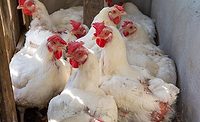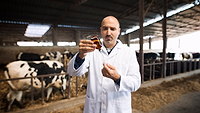Bird Flu Vaccine Works on Chickens, Maybe Turkeys Too

The U.S. Department of Agriculture (USDA) Secretary Tom Vilsack said yesterday that scientists have developed a vaccine that is 100 percent effective in protecting chickens from bird flu. The same vaccine is currently being tested in turkeys. If that proves successful, the USDA hopes to license it for widespread production. To fund this effort for nationwide distribution, the agency hopes to secure funds from the Office of Management and Budget.
Vilsack says that the development of the vaccine--which targets the H5N2 strain that has killed 48 million birds (primarily in the Midwest) since March--is just one way that future bird flu epidemics can be avoided. The virus is believed to have spread through wild bird droppings as they migrated north. The new concern is that it’ll spread again when birds begin to fly south for the winter.
Poultry producers have mixed feelings about vaccines. While turkey producers support it because turkeys are much more likely to contract viruses, egg producers and chicken farmers are not as supportive because it has proven to negatively affect trade. Ten international trade partners banned all U.S. poultry imports due to this year’s bird flu outbreak.
"There are many unanswered questions that must be addressed before any strong consideration is given to a vaccination program," says Tom Super, a spokesman for the National Chicken Council, which represents producers of 95 percent of the U.S. broilers sold. "Two concerns of several are the effectiveness of the vaccine and potential impacts on trade."
Not all regions accept poultry animals that have been vaccinated. Out of $6 billion worth of poultry and egg products exported from the U.S. each year, $5 billion of that is chicken meat. International importers of U.S. poultry products have already been encouraged not to stop trading if the vaccination programs comes to fruition.
James Summer, president of the USA Poultry & Egg Export Council says that countries are likely to refuse meat because it’s difficult to determine if birds were ever infected with the bird flu virus or if they were vaccinated.
It has not yet been determined when the vaccine would be available for nationwide production, says Vilsack.
Looking for a reprint of this article?
From high-res PDFs to custom plaques, order your copy today!




